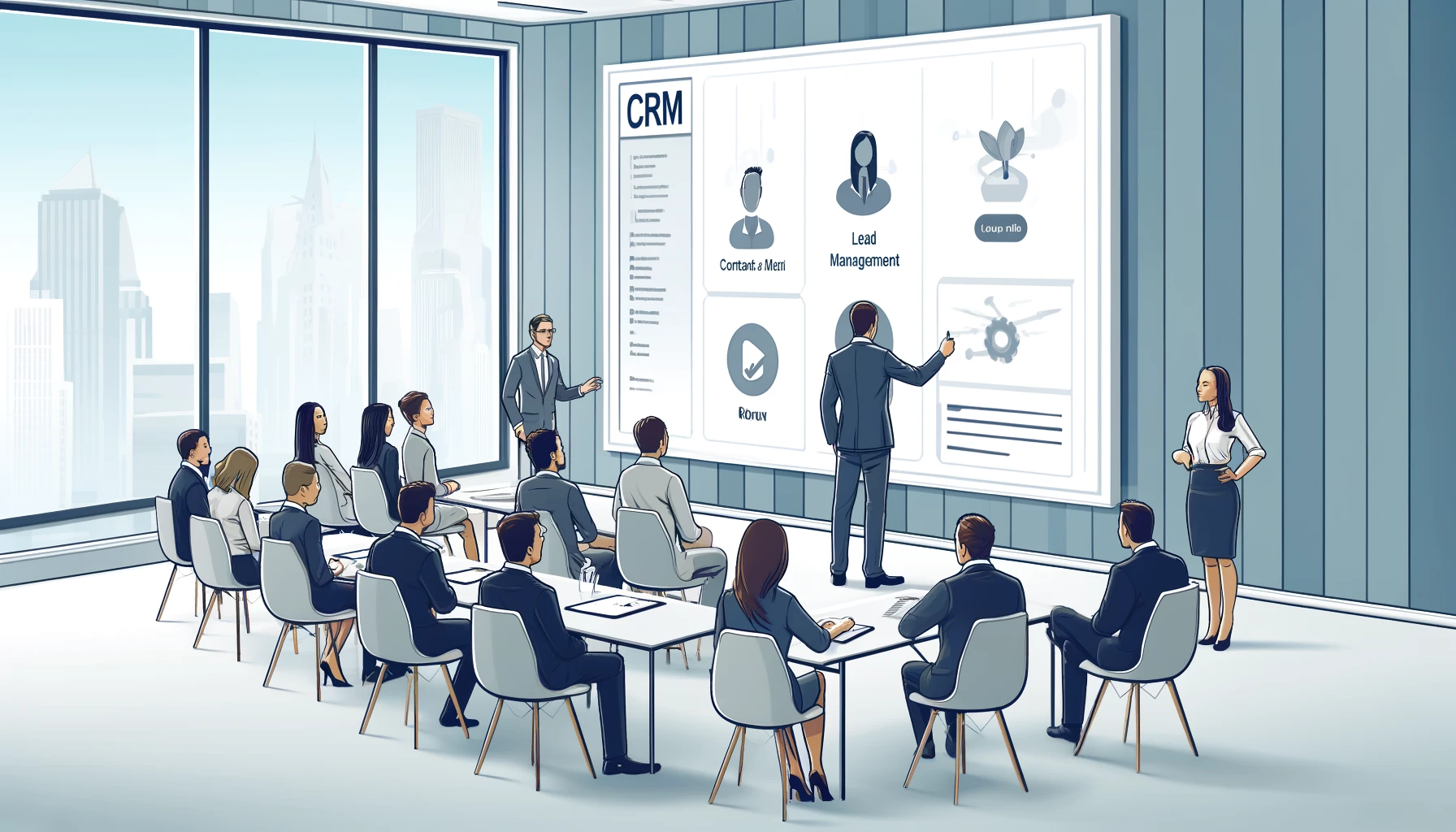What Is CRM in Real Estate: A Comprehensive Guide

Discover how CRM tools transform real estate interactions and sales processes, enhancing client relations and business growth.
Unlocking the Potential of CRM in Real Estate
The dynamism of the real estate sector demands tools that can keep pace with its ever-evolving nature. Customer Relationship Management (CRM) software serves as the linchpin for real estate professionals seeking to harness data for enhanced client interactions and operational efficiency. A CRM tailored for real estate not only streamlines communication, it also empowers agents with robust lead management, ensuring that potential clients are nurtured effectively through each step of the buying or selling process.

With features designed for mobility and accessibility, real estate CRM software allows agents to manage contracts, track performance, and access consolidated data from anywhere, at any time. Marketing automation tools integrated within the CRM can generate campaigns that resonate with target audiences, while inventory management capabilities provide real-time insights into property listings.
For those new to real estate, the importance of a CRM system cannot be overstated. It’s a digital assistant that helps manage client information, appointments, and follow-ups, which are crucial for building a strong foundation in this competitive industry. When choosing a CRM, agents should consider factors such as ease of use, customization, integration capabilities, and cost to ensure the software aligns with their specific business needs.
CRM in real estate is not just about managing existing clients; it’s about expanding your network and growing your business. By leveraging a CRM, agents can ensure no opportunity is missed and every client relationship is maximized. In the pursuit of excellence within real estate, a powerful CRM system like ozma can be the key to unlocking true potential and driving success.
Key Benefits of Real Estate CRM:
- Streamlined Communication: Ensures timely and personalized interactions with clients.
- Improved Performance Tracking: Monitors sales and client engagement metrics.
- Mobility & Accessibility: Access client data and manage tasks on the go.
- Consolidated Data Management: Keeps all client information in one secure place.
- Contract Management: Streamlines the contract lifecycle from initiation to closure.
- Lead Management: Captures and nurtures leads until they are sales-ready.
- Marketing Automation: Creates and tracks marketing campaigns automatically.
- Inventory Management: Offers real-time visibility into property listings.
Adopting a CRM system is a strategic move for any real estate professional aiming to stay ahead of the curve. It’s an investment in your business’s growth and in delivering exceptional service to your clients.
Enhancing Agent Connectivity with CRM Solutions
In the fast-paced world of real estate, staying connected is not just an advantage; it’s a necessity. Real Estate CRM software is the technological bridge between agents and their clientele, offering a suite of features that foster meaningful connections. By centralizing communication channels, CRM solutions provide agents with the tools to deliver personalized service effortlessly.
Agents using a CRM can expect a significant improvement in their daily operations. The software’s functionalities are designed with real estate professionals in mind, offering:
- Mobile Accessibility: Make updates or check client information on the go.
- Client Data Consolidation: All relevant client details are stored in one secure location.
- Automated Marketing Campaigns: Reach out to prospects with targeted messaging that drives engagement.
When selecting a CRM, it’s essential to weigh various factors such as:
- Customization: Tailor the CRM to fit your unique business processes.
- Integration: Seamlessly connect with other tools and software in use.
- User-Friendliness: Ensure the platform is intuitive and easy to navigate.

A well-integrated CRM solution like ozma not only enhances agent productivity but also provides a strategic edge in the competitive real estate landscape. It’s about creating a seamless experience for both the agent and the client, where every interaction is an opportunity to strengthen the relationship.
Key Features for Enhanced Connectivity:
- Real-Time Updates: Stay informed about market changes and client needs.
- Task Automation: Schedule appointments, follow-ups, and reminders with ease.
- Lead Nurturing: Guide potential clients through the sales funnel with precision.
Embracing a CRM platform is an investment in the future of your real estate business. It’s not just about managing relationships; it’s about elevating them to new heights through strategic engagement and unparalleled service.
By choosing a CRM that aligns with your business goals, you can unlock a world of possibilities and drive your real estate business towards sustained success.
Navigating the CRM Landscape: A Guide for Modern Realtors
In an industry where relationships are paramount, modern realtors are turning to CRM software to cultivate and maintain these vital connections. Understanding what is CRM in real estate is the first step in transforming your business operations and client interactions. This powerful tool goes beyond mere contact management, integrating advanced features that address the unique challenges of the real estate market.

For those at the start of their real estate career, embracing a CRM can be a game-changer, providing a competitive edge and laying a solid foundation for future success. When it comes to selecting the perfect CRM, consider these factors:
- Scalability: Choose a system that grows with your business.
- Support and Training: Look for providers who offer comprehensive guidance and assistance.
- Cost-Effectiveness: Ensure the investment aligns with your budget and offers a high return on investment.
By strategically employing a CRM system like ozma, realtors can navigate the complexities of the real estate landscape with confidence. This technological ally not only streamlines day-to-day operations but also elevates the client experience, ultimately contributing to a thriving real estate practice.
Choosing the Right CRM:
- User Experience: Opt for a CRM with an intuitive interface.
- Customization: Ensure the CRM can be tailored to your unique business needs.
- Integration: Select a CRM that works seamlessly with other tools and platforms you use.
A real estate CRM is not just a tool; it’s a strategic partner that empowers agents to excel in a highly competitive market. By understanding and leveraging the functionalities of a CRM, agents can ensure every client interaction is impactful and every opportunity for growth is captured.
When selecting a CRM, agents must consider:
- Adaptability: The CRM should be flexible to accommodate various business models and scales.
- Integration Capabilities: It must effortlessly merge with existing software to create a cohesive technological environment.
- Cost-Effectiveness: Agents should ensure the CRM provides a substantial return on investment by boosting productivity and sales.
A CRM like ozma, tailored for the real estate domain, provides an array of tools that can significantly impact an agent’s ability to manage and grow their business. With the right CRM, real estate professionals can expect not just to meet but to exceed their operational and client satisfaction goals.
Optimizing Real Estate Operations with CRM:
- Contract Lifecycle Management: Automate and monitor each stage of the contract process.
- Lead Cultivation: Track leads from initial contact to final sale, ensuring no opportunity slips through the cracks.
- Marketing Synergy: Execute and assess marketing campaigns that resonate with your audience, driving both reach and relevance.
By harnessing the power of a Real Estate CRM, agents can unlock new levels of productivity and client service, setting themselves apart in a competitive landscape. It’s a strategic move that can redefine the future of their business, ensuring they remain at the forefront of the real estate industry.

Adopting and implementing the right CRM tools is a crucial step for real estate agents who aspire to refine their practice and deliver exceptional value to their clients. With a clear understanding of what is CRM in real estate, agents are well-equipped to make informed decisions that will shape the trajectory of their success.

Advantages of the Right CRM:
- Centralized Information: All client data is accessible in one place.
- Automated Workflows: Save time with automated tasks and reminders.
When it’s time to choose, remember that the right CRM is not just a software solution—it’s a long-term business partner that will play a pivotal role in your real estate success.
In conclusion, understanding what is CRM in real estate and meticulously selecting the ideal platform will set the foundation for a flourishing real estate career. Embrace the change, and watch your business thrive.
FAQs
What is CRM in real estate?
CRM in real estate refers to customer relationship management systems tailored to help real estate professionals manage leads, client interactions, and transactions more efficiently.
How does CRM benefit real estate agents?
CRM benefits real estate agents by streamlining client communication, improving lead management, and enabling better organization of property listings and client data.
Can CRM software increase real estate sales?
Yes, CRM software can increase real estate sales by automating follow-ups, providing valuable insights into client needs, and nurturing leads through the sales funnel.
What features should a real estate CRM have?
A real estate CRM should have features such as contact management, lead tracking, task automation, property management, and analytics for performance tracking.
Is CRM integration with other tools important in real estate?
CRM integration with other tools is important in real estate as it allows for a seamless flow of information across platforms, enhancing efficiency and productivity.
Read more about low-code platform ozma.io
CRM for Beginners: Easy to Start!
CRM for Photographers: More Clients and Efficiency





